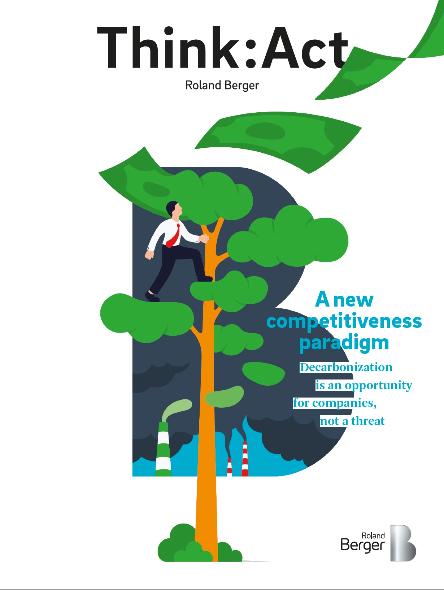Climate action: A new competitiveness paradigm
![{[downloads[language].preview]}](https://www.rolandberger.com/publications/publication_image/RB_Sustainability_New_Competitiveness_Paradigm_STU_729_Cover_download_preview.jpg)
By viewing decarbonization as an opportunity, rather than a threat, and taking immediate action on climate change, companies can gain a competitive edge.


By Yvonne Ruf and David Frans
"Business leaders need to stop thinking about decarbonization as a drain on their bottom line and start seeing it as an investment in their future competitiveness."
Action on climate change is no longer an optional or second-rate consideration for companies; it must be prioritized as a core strategic pillar. Decarbonization is essential as a sign of a business’ willingness to curb climate catastrophe. It is also key in fostering a positive brand image, maintaining customer loyalty and increasing profits.The study ‘A new competitiveness paradigm’ addresses the urgent need for climate action and provides strategic recommendations on how companies can get an edge over the competition.
If society continues on its current trajectory, scientists estimate that between 2030 and 2050 global temperatures will rise by 1.5°C – a gateway to dangerous and irreversible warming. More action is required to achieve the Paris Agreement goal of limiting global warming to less than 2°C – and ideally 1.5°C – by 2050. Keeping it below the threshold of 2°C would require cutting greenhouse gases (GHG) by almost half, compared to 2016 levels. To reach the more ambitious target of 1.5°C, GHG would need to be halved within the decade and reduced by three-quarters by 2050. Current climate policies still fall short of both goals, so stricter policies and regulation are expected.
Companies around the globe are perceiving the pressure from customers, investors and regulators to be more sustainable. Due to stricter policies and goals resulting from the Paris Agreement, businesses that don’t take action may start to see a decreased demand for their products and services, in conjunction with a rise in CO2 emissions costs. As such, these businesses will have lower margins, and could see up to 50 percent of their profits put at risk.
"In this new competitiveness paradigm, the number of tons of carbon emissions a company successfully avoids becomes one of its profit pools."
Decarbonization is a tremendous opportunity for companies. Traditionally, a company’s competitive edge is achieved by either a good cost structure, unique product or innovation. In the new landscape of sustainability competitiveness, the edge is instead determined by the company’s action on climate issues . By offering climate-friendly, low-emission products and services, firms can reduce their costs and make themselves more competitive.
Many companies have already seized this new opportunity . More than 1,500 businesses worldwide, representing over EUR 10 trillion in revenue and 19.3 million employees – including in carbon-intensive sectors – have set themselves net zero targets. The number of companies disclosing their emissions footprint has grown to represent more than 50 percent of global market capitalization.
When companies align their strategies with the new competitiveness paradigm, they tap into the potential offered by the new "currency" of carbon emissions. Roland Berger recommends the following four strategies for businesses ready to make a difference:
The pressure companies are facing to reduce their carbon footprint will only increase with time. Businesses that don’t comply will eventually see a reduction in profits and growth. Conversely, companies that act now will be able to gain a strategic pole position in the globally decarbonizing economy and to reap the rewards.
![{[downloads[language].preview]}](https://www.rolandberger.com/publications/publication_image/RB_Sustainability_New_Competitiveness_Paradigm_STU_729_Cover_download_preview.jpg)
By viewing decarbonization as an opportunity, rather than a threat, and taking immediate action on climate change, companies can gain a competitive edge.
Stay current with our latest insights on sustainability and climate action topics. We will email you when new articles and studies are published.